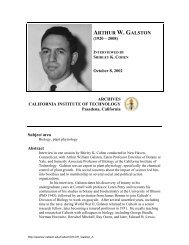Interview with Thomas A. Tombrello - Caltech Oral Histories
Interview with Thomas A. Tombrello - Caltech Oral Histories
Interview with Thomas A. Tombrello - Caltech Oral Histories
You also want an ePaper? Increase the reach of your titles
YUMPU automatically turns print PDFs into web optimized ePapers that Google loves.
<strong>Tombrello</strong>–87<br />
Remington bronzes but not much else. Now, the obvious thing when somebody like Agee comes<br />
is, “Why don’t we sell some of the Remingtons and get a more balanced collection?” And they<br />
went crazy. They could not deal <strong>with</strong> that. They had a hard time accepting the idea that they had<br />
this wonderful collection, but it was just one thing. It was just one bronze after another of<br />
cowboys and Indians. I love Remingtons, but when you have a room full of them, they all sort of<br />
look alike.<br />
Universities can be that way. They will have one strong group and they can’t get around<br />
it. They don’t realize that unless that strong group gets weaker somehow—or smaller anyway, it<br />
doesn’t necessarily have to get weaker—the rest of the department’s not going to change. You<br />
find that at universities that have, by one piece of luck, hired a star, or a person who became a<br />
star, and are then unable to get past it—to grow anything else. <strong>Caltech</strong> could have almost done<br />
that in physics.<br />
ASPATURIAN: What do you think saved it?<br />
TOMBRELLO: I’d love to think it was my staffing committee.<br />
ASPATURIAN: Which was initiated when, again?<br />
TOMBRELLO: 1986. There was a general agreement that we should do something, even before<br />
that, but we never seemed to get anywhere. Gell-Mann always called solid-state physics<br />
“squalid-state physics.” He realized there were bright people in the field; he just didn’t want to<br />
hire any of them. It was hard. You get into gridlock; it’s hard to get out unless some of the cars<br />
just go away. By 1986, clearly, Feynman was two years away from dying. It was the right time.<br />
It was hard to get appointments through; you could only get them one at a time. LIGO, you see,<br />
got started <strong>with</strong> essentially no faculty participation except Thorne, and then you can read in my<br />
Archives LIGO oral history about how Robbie [Vogt] got chosen to head LIGO. But there are<br />
still relatively few professors attached to LIGO. [Barry] Barish [Linde Professor of Physics,<br />
emeritus] came in sort of part-time to be director. It’s a great thing to have happened for LIGO.<br />
Robbie had run to the end of his tether and couldn’t go on any further. They needed somebody<br />
who would pick it up from there. Robbie had done an enormous amount—they wouldn’t exist if<br />
it hadn’t been for Robbie. But he’d gotten to the point where somebody had to carry the project<br />
http://resolver.caltech.edu/<strong>Caltech</strong>OH:OH_<strong>Tombrello</strong>_T

















